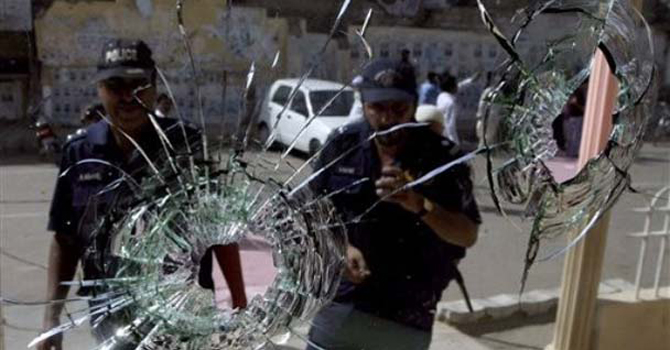
KARACHI: Gunmen opened fire on a UN vehicle in Pakistan's volatile city of Karachi Tuesday, wounding a foreign doctor working on a polio immunisation campaign and a local driver, officials said.
The shooting, which happened in the low-income eastern neighbourhood of Soharb Ghoth, was the latest sign of disturbing resistance to a widely publicised three-day vaccination campaign, which began Monday.
The Taliban have banned immunisations in the northwest, condemning the campaign as a cover for espionage since a Pakistani doctor was jailed after helping the CIA find Osama bin Laden using a hepatitis vaccination programme.
“A WHO vehicle was fired upon with gunshots. One international staff and one local driver were injured in the incident,” Maryam Yunus, spokeswoman for the United Nations' World Health Organization, told AFP.
She said the doctor from Ghana and the Pakistani driver had been transferred to a private hospital in the southern port city where their condition was stable.
“They are out of danger,” Yunus said.
Attacks on foreigners are rare in Karachi, but parts of the city are highly volatile. Ethnic, sectarian and politically-linked violence has killed at least 740 people in the city so far this year alone, rights activists say.
Police blamed the shooting on two Afghan men. Soharb Ghoth neighbourhood is home to thousands of Afghan refugees and migrants from northwest Pakistan looking for work in what is Pakistan's largest city, with a population of 18 million.
Local police station chief Mohammad Sultan said the doctor could have been targeted deliberately, because he had been working in the neighbourhood for about three months.
“It could be related to the polio campaign, as there is resistance in the population against it. We are, however, still investigating the real motives,”Sultan told AFP.
The UN staff were travelling in an unmarked, white double-cabin pick-up.
Local TV channels broadcast footage of bullet holes in the vehicle.
A health expert, speaking to AFP on condition of anonymity because he was not authorised to speak to the media, said the attack was the latest in an alarming trend of violence against polio workers.
He said there had been threats and announcements in mosques branding the vaccine anti-Islam and blamed “a new wave of attacks on polio workers” on the CIA's use of Pakistani doctor Shakeel Afridi to help find bin Laden.
The doctor was jailed for 33 years in May after helping the CIA find Osama bin Laden using a hepatitis vaccination programme as cover.
“It has become a very serious and critical issue. People suspect foreigners involvement in the programme and fake campaign by Afridi has given further credence to conspiracy theory,” he said.
He said polio workers were beaten in the capital Islamabad on Monday, a team fired on in the southern town of Jacobabad and a motorcycle stolen in the southwestern town of Ziarat.
“It is an alarming situation because neither the government, nor international aid agencies have a clear strategy to deal with this issue,” he said.
WHO said later Tuesday that there was currently “no evidence to suggest that this was a deliberate or targeted attack against polio eradication efforts or WHO”.
Pakistan is one of only three countries where polio remains endemic, along with Afghanistan and Nigeria.
The Taliban ban and insecurity have forced officials to postpone inoculations in parts of Pakistan's northwestern tribal belt, jeopardising the health of more than 350,000 children.
Pakistan says 34 million children under five will be targeted in the campaign that runs until Wednesday.
The highly infectious disease affects mainly the under-fives and can cause paralysis in a matter of hours. Some cases can be fatal.
The Lancet medical journal has said vaccination problems led last year to Pakistan's highest number of polio cases in a decade, 198, compared to 144 in 2010.












































